Lower immigration: State Gov needs to rethink Plan Melbourne - Clifford Hayes MP
The Victorian Government’s master planning document, Plan Melbourne— which drives high density development throughout our suburbs—assumes continuing rapid population growth over the next decade. The coronavirus pandemic, and the Federal response to it, means this assumption has been overtaken by events, and that Plan Melbourne is out of date. The Morrison Government expects a fall of up to 300,000 people moving to Australia over the next 2 years. The Federal Government expects net overseas migration to fall by 30% in the current financial year, and to crash by 85% in 2020-21 to around 40,000.
Some of the drivers of this fall are outside Australia’s control, such as lockdowns in other countries and a collapse in international air travel. However the Federal Labor Opposition has also signalled a reduction in migration, calling for Australia’s immigration to be overhauled and curtailed in the wake of the pandemic. Opposition
spokesperson, Senator Keneally, has written,
“Do we want migrants to return to Australia in the same numbers and in the same composition as before the crisis? The answer is no”.
Against this background, the Victorian Government needs to quickly reassess Plan Melbourne—which makes high rise and high density housing a planning priority at the cost of any other considerations. Otherwise we risk being caught living in the past. It is likely that businesses that have developed a dependence on rapid population growth will struggle, and the Victorian Government needs to plan for this.
It would also be wrong for the Government to continue to impose rules enforcing denser populations on communities that don’t want them. Plan Melbourne has been a vehicle for Councils to be told they have to accommodate “their share” of Melbourne’s population growth. The Government should revisit its population projections, and not be caught out by a potentially fast changing population landscape.
It certainly should not continue to impose high-rise coronavirus traps, forcing people to live on top of each other, on unwilling communities.
The evidence around the world is clear –a dense population is a vulnerable one. The Victorian Government needs to understand that the game has changed, and move with the times.
Calls to Up immigration often ignore Australia's economic and social reality
 Daniel Ziffer's journalistic effort for the ABC Saturday May 9th, "Calls to cut immigration often ignore Australia's economic and social reality," was sparked off by Shadow Minister for Immigration and Home Affairs, Senator Kristina Keneally's week old article, calling for a review of the numbers of skilled temporary workers. The purpose of the review she was calling for was to give Australians who have lost their jobs due to coronavirus lock-down, first preference in the job market when "normality" returns. This mild and reasonable suggestion has met with a frenzy of opposing articles in the mainstream media, and this ABC concoction is yet another of these.
Daniel Ziffer's journalistic effort for the ABC Saturday May 9th, "Calls to cut immigration often ignore Australia's economic and social reality," was sparked off by Shadow Minister for Immigration and Home Affairs, Senator Kristina Keneally's week old article, calling for a review of the numbers of skilled temporary workers. The purpose of the review she was calling for was to give Australians who have lost their jobs due to coronavirus lock-down, first preference in the job market when "normality" returns. This mild and reasonable suggestion has met with a frenzy of opposing articles in the mainstream media, and this ABC concoction is yet another of these.
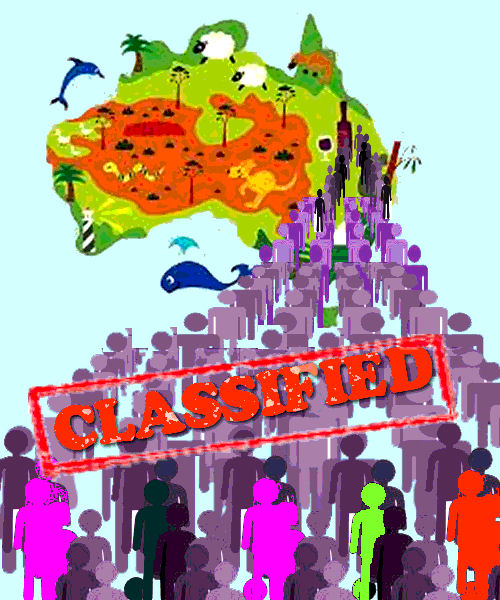
In summary, the article is making the points that our social reality is multi-ethnic, as indicated in a photograph; and that senator Keneally, because she is an immigrant, has no moral right to suggest lowering the numbers of skilled temporary overseas workers following the Covid 19 crisis. Ziffer wrote (in the article) that Australia's important money-earners include "opportunity and growth". He uses the example of a successful migrant who is making money from population growth, which in turn is meant to illustrate the need for ongoing immigration and population growth (!).
Ziffer also notes that GDP per capita is actually falling, wages are "stagnant", and that people feel they are going backwards. Yet he later says that "We've become vastly rich — economically as well as a society — because of our diverse make-up." (!) Which is it? Are we feeling left behind or are we vastly rich? Does it depend who we are?
His closing comments relate to his earlier criticism of Senator Keneally for having the temerity, as a migrant, to make a public statement on immigration settings, even though she is the Opposition spokesperson on Immigration and Home Affairs!
He finishes up lurching to the extreme of calling this, "closing the door" to immigration (which was not suggested by Ms Keneally nor any other published commentator in the news this week), saying this cannot be done, because it would mean all of us - apart from the just over 3% of us who are of Aboriginal or Torres Strait Islander heritage - would be denying our ancestors, since they were all migrants.
So, from the Ziffer perspective, Australia is locked into perpetual immigration, at a rate that cannot be questioned, by those who live here, those who come here, and even by the the Shadow Minster for Immigration and Home Affairs!
Who does Labor MP, Anne Aly, work for, if not Australians?
 Labor MP, Anne Aly, has been widely publicised objecting to immigration and population being mentioned together by Kristina Keneally, Shadow minister for immigration and citizenship, and NSW Premier from 2009 to 2011. Aly's tired cliches have predictably summoned up a dog-pack of growthists claiming to hear dog-whistles and to see Pauline Hanson look-a-likes. The growth lobby and its spokespeople are panicking, because the chickens of their land-speculation are coming home to roost, as COVID-19 dries up immigration. The more Anne Aly supports them, the more publicity she will get - always useful for an aspiring politician - and damn the consequences for Australians.
Labor MP, Anne Aly, has been widely publicised objecting to immigration and population being mentioned together by Kristina Keneally, Shadow minister for immigration and citizenship, and NSW Premier from 2009 to 2011. Aly's tired cliches have predictably summoned up a dog-pack of growthists claiming to hear dog-whistles and to see Pauline Hanson look-a-likes. The growth lobby and its spokespeople are panicking, because the chickens of their land-speculation are coming home to roost, as COVID-19 dries up immigration. The more Anne Aly supports them, the more publicity she will get - always useful for an aspiring politician - and damn the consequences for Australians.
Kenneally's 'offending words':
"As a result of COVID-19, Australia will soon have an opportunity to do something we have never done before: restart a migration program. When we do, we must understand that migration is a key economic policy lever that can help or harm Australian workers during the economic recovery and beyond.
We must make sure that Australians get a fair go and a first go at jobs. Our post-COVID-19 economic recovery must ensure that Australia shifts away from its increasing reliance on a cheap supply of overseas, temporary labour that undercuts wages for Australian workers and takes jobs Australians could do." (Kristina Keneally, "Advancing Australia," Sunday Age, 3 May 2020.)
Anne Aly's 'indignant' response:
Showing woeful or feigned ignorance of the components of population growth in Australia, to the acclaim of the big end of town, Labor MP Anne Aly has objected to immigration and population being mentioned together by Kristina Keneally.[1]
In fact immigration has, until a recent pause due to COVID-19, composed more than 60 per cent of Australia's shockingly rapid population growth for nigh on a decade. So, what's Anne Aly's problem with the truth, that she thinks gives her licence to attack Kristina Keneally (or by implication anyone else) for voicing it? Worse, Aly, who is supposed to be representing Australians, has criticised Keneally for wanting to put Australians first. If not Australians first, then who, Ms Aly?
Aly is not the only one doing service for the growth lobby in the ALP, which is known for its massive investments in property finance and development. (See, for instance, /node/1781.)
The Drum
The ABC's The Drum ran an item on this on Monday 4 May 2020. The clip starts around the 30 min mark on the ABC podcast. Geoff Gallop and the rest of the panel, including Abdul Rizvi (ex immigration public servant from 1990s to 2007), uncritically recited the usual propaganda about how immigration creates jobs, Australians don't want to do some jobs, Australia needs it to cope with ageing (they must be pleased with COVID-19's lethal effect on the elderly), falling natural increase, etc. A union representative did mention the problem of exploitation through the short-term work visa system. Rizvi acknowledged this is a problem. As an incorrigible immigration advocate, however, he claimed it is solvable. Whilst it might theoretically be solvable, like world hunger, it has actually been getting much worse, due to legal and constitutional changes. As we have come to expect from the ABC, unfortunately, there was no sign of an articulate representative of an opposing view.
Fran Kelly
Kristina Keneally was interviewed by Fran Kelly on Tuesday morning (5 May 2020) on ABC RN. Kelly basically accused Keneally of dog whistling and undertones of racism in her weekend article. (This was also articulated by Australian Director at Human Rights Watch, Elaine Pearson, in a punishing tone last night on Q and A, egged on by the presenter of course.) I thought Keneally held her position very well in the face of Fran Kelly's interrogation, and came across as coherent and reasonable. She also put her position in a human context, with her call for temporary migrants who are stuck here due to Covid 19, being given government assistance, as are Australian workers. The part of what Keneally wrote, that Kelly latched onto, was that Keneally advocated Australians being catered for first in the post COVID-19 job market before importing workers from overseas.
This was supposedly sounding like Pauline Hanson and that is bad because Pauline Hanson said it (!). Furthermore Pauline Hanson has thrown the spotlight on it as something she's been saying for years.
Seems we are still stuck in a closed circuit where anyone who raises the issue of immigration in any form will be hammered back in the media with accusations of racism. It has worked so well that those who benefit from it will never tire of it.
Jobs and growth
The Financial Review editorial for 4 May 2020 would have the reader think that Australia and Australians have been prospering over the last three decades. Ordinary Australians have lost heavily and continue to.
Jobs and growth have not brought prosperity. In fact "jobs" has meant overwork for some and underemployment stress for others. "Growth" has meant overcrowding, housing stress and reduced quality of life, including destruction of the environment. What's growing is just the number of people partaking in this!
The Financial Review editorial criticises the need to even talk about immigration numbers policy in Australia, since the numbers have dropped with the closing of our borders due to COVID-19. But this is precisely when we should talk about it, because, to a certain extent, the pressure from the growth lobby has to relent during this pause. Or you would think so, however, they are coming out in force, as we can see from the above.
Sometimes you hear the other side, as in this SBS article:
'Industry professor Warren Hogan, an economist from the University of Technology, Sydney,has said now was a good time to have the debate about migration levels. “There is no doubt that Australia is probably the highest immigration nation in the world. This is a chance to think about if that’s the right strategy going forward,” he said.' (Source: Jarni Blakkarly, "Reimagining a new Australia': Experts back calls for a debate about Australia's migrant numbers post-coronavirus," SBS News, updated on 4 May 2020.https://www.sbs.com.au/news/reimagining-a-new-australia-experts-back-calls-for-a-debate-about-australia-s-migrant-numbers-post-coronavirus)
But if you read the whole article, Professor Hogan is outnumbered, two to one, by pro-immigration 'experts', with their mass-produced cliches.
"University of Sydney Associate Professor Anna Boucher agreed it was an opportunity to examine Australia's migration program, she said it was important to acknowledge migrants have an important role to play in the recovery."
(Source: Jarni Blakkarly, "Reimagining a new Australia': Experts back calls for a debate about Australia's migrant numbers post-coronavirus," SBS News, updated on 4 May 2020.https://www.sbs.com.au/news/reimagining-a-new-australia-experts-back-calls-for-a-debate-about-australia-s-migrant-numbers-post-coronavirus.)
"Associate professor of human geography Alan Gamlen from Monash University said migration levels would need to stabilise at around the same rate as pre-coronavirus in order for Australia to return to the same level of economic growth." (Source: Jarni Blakkarly, "Reimagining a new Australia': Experts back calls for a debate about Australia's migrant numbers post-coronavirus," SBS News, updated on 4 May 2020.https://www.sbs.com.au/news/reimagining-a-new-australia-experts-back-calls-for-a-debate-about-australia-s-migrant-numbers-post-coronavirus.)
The real problem is that greedy land-speculators who have been running the country for years and who have borrowed to build apartments to sell to new migrants, are now looking at financial collapse, while the rest of us are looking at a lower cost of living as population-pressure on housing-prices finally falls.
But the growth lobby knows how to put the wind up the powerful, and the Australian Prime Minister knows which side his bread is buttered on:
"Cutting immigration would hurt the economy and communities: Morrison." Sydney Morning Herald, 5 May 2020.)
Hallelujah! It didn't take him long. But what about COVID-19? It hasn't gone away. The Prime Minister also said he was going to a football match despite the pandemic, then backed down, shortly before we all went into lock-down.
Panic among the growthists
The growth lobby and its spokespeople are panicking. Maybe because they don't want Australians or those living here to realise they enjoy aspects of their lives now, not tearing around, having some time for themselves off the work-commute treadmill. They (the growth lobby) are saying, "Don't get used to it. You must take The Economy's medicine, even though you don't like it. You all understand why chickens are raised in crowded conditions. It's good for the bottom line. Likewise, when you are more crowded in, it is better for the bottom line - not yours exactly, but that of your owners - just like the chickens. You just have to believe that what is good for someone else's bottom line is good for yours. It takes a certain way of thinking. You have to believe.
NOTES
[1] "Coronavirus: Aussies-first rhetoric must stop in immigration debate, says Anne Aly," The Australian, 4 May 2020.
The Great Realisation - A post COVID-19 video
What does the future hold after COVID-19?

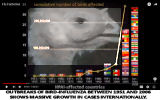 Will governments buy back vital resources and essential services from the embattled private sector, or will they allow the wealthy to pick up resources and monopolies cheaply, pressing the unemployed and endebted into slave-like conditions? Can we adapt to or avoid a future that appears to hold more and worse pandemics? If COVID-19 is a pandemic designed for elite purposes to cull the aged and weak, why have some governments tried to protect their vulnerable populations? We have obviously become too economically dependent on the model of continuous accelerated growth in human numbers and human activities globally to be able to protect ourselves from the pandemics that come with this economic model. At the same time the long-predicted oil-resources breakdown in supply is looming. Can any good come of this? Is this an opportunity?
Will governments buy back vital resources and essential services from the embattled private sector, or will they allow the wealthy to pick up resources and monopolies cheaply, pressing the unemployed and endebted into slave-like conditions? Can we adapt to or avoid a future that appears to hold more and worse pandemics? If COVID-19 is a pandemic designed for elite purposes to cull the aged and weak, why have some governments tried to protect their vulnerable populations? We have obviously become too economically dependent on the model of continuous accelerated growth in human numbers and human activities globally to be able to protect ourselves from the pandemics that come with this economic model. At the same time the long-predicted oil-resources breakdown in supply is looming. Can any good come of this? Is this an opportunity?
There are many reasons why a return to normality after COVID-19 is unlikely.
The underlying reason is the world-trend to a rapidly increasing incidence of serious new cross-species viral diseases (zoonoses). The most likely to produce epidemics and pandemics are those coming from large populations of domestic animals raised in intensive farming. Where once a zoonose would probably kill a novel host before the virus got a chance to jump to another individual, our new tendency to put livestock together in vast dense populations, along with our increasing tendency to live in vast dense populations ourselves, means that viruses can find multiple hosts to replicate in before their first host dies. Because we have no specific immune defenses against new zoonose viruses, they are much more likely to infect and kill us than longstanding human diseases.
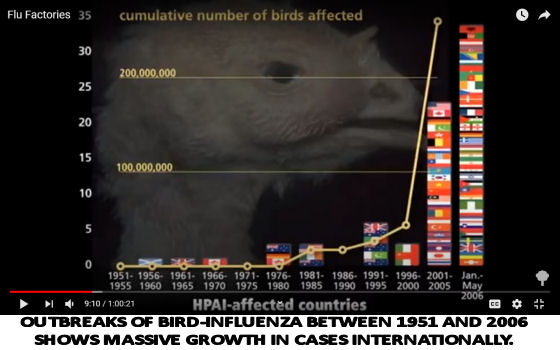
The embedded video below, Flu Factories, gives a graph between 1951 and 2006, showing that international progression of avian flus (among the most dangerous sources of zoonoses shared between pigs and birds), began building up with the institution of ever larger factory farms around the 1980s, and skyrocketed from the beginning of the 21st century.
It quotes a summary of the components of risk:
"- Increased demand for poultry products.-
- Increase in commercial peri-urban production.
- Increase in size of susceptible bird population in interface between extensive and intensive production.
- Increase in pathogenic virulence.
- Enhanced exposure in human population.
- Emergence of human pathogen.
- Human-to-human transmission pattern."
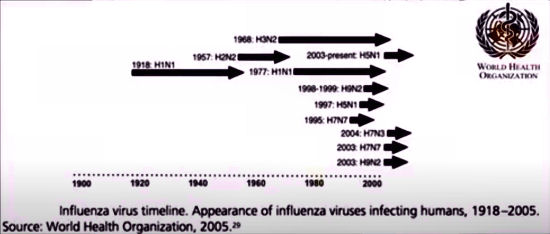
Dangerous divide between veterinary and human health sectors
Writing of the east in 2014, the World Health Organisation notes
"[The lack of] collaboration between the animal and human health sectors under the concept of “One Health” approach, which links the human with the animal health sector integrating the animal and human disease surveillance and response system that could, otherwise have helped controlling the zoonotic infections in animal reservoirs, enable early outbreak detection, and prevent deadly epidemics and pandemics." [Source: World Health Organisation: http://www.emro.who.int/fr/about-who/rc61/zoonotic-diseases.html [1]
This collaborative failure was and is also a major problem in the west, which, in the problem of COVID-19 control, amounts to a failure of communication in the context of dissimilar paradigms between the economic sector and the health sector. So, we have health professionals urging quarantine and business urging abandon of quarantine. We have obviously become too economically dependent on the model of continuous accelerated growth in human numbers and human activities globally to be able to protect ourselves from the pandemics that come with this economic model.
We could mitigate some of the risk within the current system
The above-cited World Health Organisation article http://www.emro.who.int/fr/about-who/rc61/zoonotic-diseases.html, which has a number of useful recommendations, correctly suggests that practising barrier nursing for all hospital patients would probably avoid almost all epidemics. Unfortunately, after antibiotics became widely available in the second half of the 20th century, hospitals all over the world became increasingly casual about infection control.
And we could return to reusable and locally produced hospital equipment: Post 1970s, with growing reliance on plastics and paper disposables, hospitals reduced their independent options by abandoning much in-house sterilisation of reusable instruments along with the laundering of reusable gowns, masks, and other protective equipment. As we know, the reliance on cheap imported sources for disposable equipment and tools has defined 21st century inadequacy in the management of COVID-19.
If we return to business as usual, however, with factory farming, clearing of wilderness, dense human populations, mass people movement internationally, and international trade, especially in animals and plants and their products, we will continue to experience pandemics. Some will have much higher fatality than COVID-19.
Politics of the current pandemic
The current pandemic is like a test of our social and political resilience, as well as our immune resilience, and its management presents something of an economic and moral puzzle, because of COVID-19's tendency to cull the weak and elderly - those people we have been taught by popular economic rationalism to blame all our woes on. (See /taxonomy/term/265 and /taxonomy/term/393.)
Whilst COVID-19 might look like a pandemic specially engineered on order from economic growth lobbyists who scapegoat the elderly and infirm, whilst encouraging mass migration of younger, haler, more fertile, cohorts, deemed economically more productive, this may only be coincidence.
Britain, Sweden and the United States have behaved more in tune with such economic ideologies, throwing their populations to the wolves, with cries of 'herd immunity'. Some governments, however, actually seem keen to avoid this opportunity of culling the elderly and infirm, when they have previously been so disparaging and cruel towards them. Australia and New Zealand are examples of such countries. What could explain this apparent humanity among an elite composed of economic rationalists, who generally only value their populace on condition of high productivity? Did politicians' wives, mothers, and fathers, get to them? Or is it because most at the top of government, political parties and corporations, and armies, are old themselves? Is it about the look of it, the desire to avoid mass graves and piles of cardboard coffins, US and Brazil-style? Is it about avoiding a glut of cheap housing and plunging property prices? Is it about avoiding total collapse of the hospital system, when surely they could have sequestered parts for themselves? Is it about avoiding economic collapse of old-age care businesses? Is it about currying favour with the elderly voter cohort? Is it about an exercise in preparing for the next worse epidemic? Is it about fear that the public will revolt at the prospect of their elders drowning in putrefacted lungs? Is it about shock at the prospect of shiny economic principles besmirched by medieval suffering and dirt?
It is certainly hard to figure out. Maybe what happened was that the pandemic took the mainstream press by surprise, and what we got, for a change, was a spontaneous response by the usually pre-programmed journalists. The elites, who are normally spoon-fed by the mainstream press, and protected from realising how angry some voters are, were panicked at the idea of popular rage. Usually they are protected from our perrenial rage at housing prices, homelessness, and rotten wars, because it is rarely reported and we have no independent public talking stick and means of assembly, so are unable to organise beyond indignation and that indignation is largely impotent because invisible to the political class. I take the near collapse of the anti-war movement as my model in this, since it appears to have been related to the mainstream press having simply stopped reporting on anti-war protests after the last big world protest against the Iraq war. Whilst I would like to believe that the alternative press can take care of reporting, it does seem that the mainstream still dictates the propaganda, hence what the elite politicians react to.
So, did politicians in Australia and New Zealand react to protect their vulnerable populations simply because they were afraid of public indignation? (All the while preaching against the use of protective face-masks.)
Or did the mainstream press jump at the opportunity to sow economic panic, so that media moguls and their friends could buy up assets and businesses cheap? And the politicians fell in with this plan under pressure to avoid public indignation about plague.
An engineered virus commissioned by elites?
There is little evidence to suggest that this virus was engineered, but a not insignificant number of people believe that elites would do so. After all, elites maintain massive military machines that design biological warfare, and constantly engineer the most brutal wars-for-profit in what has become the biggest game in town. But why would they or anyone need to commission a zoonose flu, when we have so many new zoonoses coming on board at faster and faster rates, from massive factory farms, and from the bush, as human population expands into what remains of forests and wildernesses, displacing exotic animals, and sucking the last endogamous and sedentary tribes into the vast human homogeneity hopper?
"During the past decades, many previously unknown human infectious diseases have emerged from animal reservoirs, from agents such as human immunodeficiency virus (HIV), Ebola virus, West Nile virus, Nipah virus and Hanta virus. In fact, more than three quarters of the human diseases that are new, emerging or re-emerging at the beginning of the 21st century are caused by pathogens originating from animals or from products of animal origin. A wide variety of animal species, domesticated, peridomesticated and wild, can act as reservoirs for these pathogens, which may be viruses, bacteria, parasites or prions. Considering the wide variety of animal species involved and the often complex natural history of the pathogens concerned, effective surveillance, prevention and control of zoonotic diseases pose a real
challenge to public health." [Source: "Report of the WHO/FAO/OIE joint consultation on emerging zoonotic diseases," (May 2005) p.5. https://apps.who.int/iris/bitstream/handle/10665/68899/WHO_CDS_CPE_ZFK_2004.9.pdf]
Why would elites encourage something that, anyway, threatens to put the kybosh on economic activity and mass people movement? Have they seen the writing on the wall, the collision of overpopulation with undersupply? Is this a way for them to lock populations down so they can control revolts against mass immigration? But the lock-downs stop mass immigration.
You could argue that big fish that survive will be able to buy up multiple businesses and assets dirt cheap, in the way that Mr Soros picks up currencies and coal mines cheaply in the wake of wars and climate activism. In the short-term, it would be hard to counter this one.
In the longer run, however, inevitably, more virulent viruses will have the effect of sparsening populations, ultimately making them less infective. Substantially sparser populations world-wide will really wreck the connective fibre of the international capitalist system, and will probably wreck national systems, sparing all but local systems. Depending on how much populations and global trade and travel are reduced, humans will spontaneously reorganise into small viscous populations, developing their own local immunities.
The elites, however, may well benefit from this too, on the way down. This would be because, if we spiral into depression, people will work for tiny wages, even for their keep, or as slaves, everywhere, creating local alternatives to both imported and outsourced cheap overseas labour.
Oil prices....
At the same time as the pandemic, the long-predicted oil-resources shortage is looming, although it is initially presenting as an oil-glut. Reduction in economic activity through mass quarantines has led to collapse in demand for petroleum. Since the 1970s, oil discovery and production have become increasingly difficult and costly. Easily drilled and pumped sources of crude have long given way to hard-to-access mixed liquids and gases, including fracked and vegetable ones. Oil exploration and production decline and stop in the absence of sufficient investment. Overleveraged companies fail under economic stress, especially with the kinds of costs involved in oil-exploration and exploitation. Countries dependent on oil-revenue descend into economic depression. Supply chains are disrupted by business failures. Machinery falls into disuse. Skills are lost or poached. Predators and competitors destroy oil-fields in order to privilege their own production recovery. Ultimately governments and conglomerates, including banks, will be able to buy up oil exploration and production cheap. Western governments have tended to enable corporations, to the detriment of economic and equitable supply, and have gone in with their war machines to destroy or wrest oil production from public companies in Iraq, Libya, Syria, Venezuela, etc. The stop and start mode is inherently costly and disruptive. Probably the only reliable mode of oil and gas production is by governments, which do not have to make a profit. As Colin Campbell wrote in the 1990s,
"The Soviets were very efficient explorers, as they were able to approach their task in a scientificmanner, being able to drill holes to gather critical information, whereas their Western counterparts had to pretend that every borehole had a good chance offinding oil." [Source: Colin Campbell, "The Caspian Chimera," Chapter 5, in Sheila Newman, Ed. The Final Energy Crisis, 2nd Ed., 2008]
Some possible solutions and adaptations
The COVID-19 pandemic has revealed fundamental weaknesses in global supply system.The need for governments to take over outsourced services and resources in order to provide for vital needs reveals the fallacy of privatisation for profit, and exposes the notion of privatisation for 'efficiency' as laughable.
The failure of private businesses and corporations provides a serendipitous opportunity for governments to cheaply buy back vital resources, such as land, power and water, and essential services, like airlines, roads, hospitals, land-production and housing etc.
Deglobalisation of the economy means ending mass migration and foreign ownership of resources and essential services.
Without Australia's massive population growth, which relies on mass immigration, the land and housing sector would no longer support our huge and immensely costly private property and infrastructure development industry. Until Primeminister Menzies in the 1960s, who also encouraged mass immigration, government was the main land and housing production source.
Governments now have the opportunity to re-regulate land and other vital resource prices in order to reduce the cost of living and production, to get us through the coming economic depression, and beyond. Lower land-prices would mean more local ownership and the opportunity for more local food production, proportionately reducing the need for the cash economy. These changes would make it possible to reduce the hours of work that people need to earn a living and the need for consumerism to support more workers.
Governments should also be able to organise the share of essential work more equitably.
Populations in lock-down have had the opportunity to investigate the notion of leisure, the meaning of life, and even to smell the roses. Released from the treadmill, but at risk of their lives, more may have started to question the authority of the elites and be more willing to participate in political self-determination. Nonsensical advice about not wearing masks, which must have had fatal consequences, was given by the highest authorities in the land. Will this lead to wider public loss of blind faith in media-created and promoted figureheads, resulting in ordinary people doing their own research and testing and trusting their own judgement, finding leaders locally, rather than accepting the leadership choices and policy dictates of a distant political caste?
NOTES
[1] This paper is undated but appears under the "Comité régional » Sixty-first session," which made its annual report in December 2014.
Video - Property developer laughing hysterically all the way to the bank
Do we really need The Economy? Article by Sally Pepper
 In this article, Sally Pepper proposes that there is an economy with a small 'e' and The Economy with a big 'E'. As well as threatening its survival, COVID-19 has called the big E economy into question. Sally says, "The economy with a small 'e’ is a way of describing what we do. The Economy with a capital “E” is something we serve, whether we like it or not. To please The Economy we have to behave in such a way that it looks its best and is pleased with itself. The Economy seems to be like a teenage boy, with a voracious appetite. It never develops beyond the need to grow bigger, endlessly. It is like a monster that we have given rise to and are doomed to cater to forever."
In this article, Sally Pepper proposes that there is an economy with a small 'e' and The Economy with a big 'E'. As well as threatening its survival, COVID-19 has called the big E economy into question. Sally says, "The economy with a small 'e’ is a way of describing what we do. The Economy with a capital “E” is something we serve, whether we like it or not. To please The Economy we have to behave in such a way that it looks its best and is pleased with itself. The Economy seems to be like a teenage boy, with a voracious appetite. It never develops beyond the need to grow bigger, endlessly. It is like a monster that we have given rise to and are doomed to cater to forever."

The corona virus has been really bad for “The Economy.” We can tell that from the falls in global stock markets over the past few weeks. Those whose wealth is in stocks are now poorer or at least not as rich. The stocks have fallen, mainly, I assume, because of smaller earnings, due to decreased activity and, therefore, anticipation of lower or no dividends for shareholders. There are of course winners and losers, but the indices are telling us clearly where the stock market has headed.
Air, land,and sea traffic, have all diminished, globally. Traffic within cities, towns regions, and countries, has also diminished, as people comply with lockdown requirements. This means that less fossil fuel is being burned, and so there are fewer emissions, and clearer skies have been noted in many cities of the world.
The kinetic aspect of humanity has been toned down. Movement has slowed. Less work is being done, at least less of the work that went into earning money. People are now working on projects at home that they have been postponing for years for lack of time. This transfer of effort is very bad for The Economy.
Shops, other than supermarkets, pharmacies, and other outlets for essential goods, are now closed. Restaurants, clubs , sporting facilities, and gyms, are now closed . Workers have been laid off, but the government has chipped in to provide a living income to those expected to return to their previous employment, when life returns to normal. I assume those employees are now catching up with cleaning the bathroom, weeding the garden, planting seasonal vegetables and having time to think………as I am
Immigration and travel have stopped. Foreign nationals and non-residents are not allowed into the country and returning nationals have to spend two weeks supervised in isolation in hotels before going to their place of residence, which is where we are all in various states of isolation. The frenetic pace of growth has slowed to a near standstill If this new state of affairs were to continue, it would mean a rest from construction and road works, and less destruction of trees and gardens in the urban areas of Victoria. We are, in fact, headed for that most dreaded economic state of affairs - a recession. This translates into a very sick Economy! Might The Economy even die?
We, however, will still go on living, as long as we escape the clutches of the virus.
What will life be like? We already have some idea, as we are now living it and have already started changing. We could, in future, turn our focus to more essential activities, like gardening and producing food, doing repairs around our homes to ensure they remain standing and weather-proof, and sewing masks to protect us from the virus. We might start to get creative in the community sense, growing and exchanging produce. We could get to know our neighbours, who we have been too busy to speak to hitherto. We could learn from the alternative fringe of future-focused urban farmers, tucked away in newly gentrified inner northern suburbs, or in the less fashionable outer suburbs of Melbourne, or in the nearby countryside. These re-born farmers are generous with their knowledge, which can also be found on sites such as Face Book and You Tube.
With the loss of jobs, many renters have been left in the position of not being able to pay the rent. This is a problem for the renter and the landlord, especially if the landlord is making payments to a bank. In normal times, with hundreds of thousands of people entering Australia every year, the landlords would have their choice of paying tenants, but with the human avalanche stopped in its tracks, the landlord might just have to negotiate with both his bank and the tenant, for a mutually agreed outcome, and as little stress as possible. As we are being told in the mainstream media, “We’re all in this together.”
It seems to me that even if things do not go back to normal we can work out a new way of operating – something we negotiate amongst ourselves.
But am I being inconsiderate of The Economy?
An economy, at its most fundamental, is the sum total of the commercial activity or exchanges that happen between us. In the absence of overarching forces, we will work it out, especially if we have to. Economic activity will not cease, but it will be fit for purpose. I would call this our "economy with a small ‘e’". This economy is not our monarch or our religion, and it is not something we must serve. Our society, behaving in our own best interests, creates this economy. The economy with a small 'e’ is a way of describing what we do. The Economy with a capital “E” is something we serve, whether we like it or not. To please The Economy we have to behave in such a way that it looks its best and is pleased with itself. The Economy seems to be like a teenage boy, with a voracious appetite. It never develops beyond the need to grow bigger, endlessly. It is like a monster that we have given rise to and are doomed to cater to forever.
Do we really need this demanding perennial teenager, The Economy? Or can we just get on with our lives and let it become a decent citizen and part of our community?
Complaint about Dictation from The Conversation re COVID-19 article
 Dear Censorial Overseers
Dear Censorial Overseers
The deletion of the comment quoted below in this notification is perhaps the most odious of all those made under this article today, all done without any clearly discernible reason but with quite evident rhyme. The comment below asks you to show respect for these commentators who have suffered deletion of their genuine and reasonable comment by providing an open advice as to the basis of that consistent disbursement of negative action.
The unavoidable message from your early closure of comments, following directly upon the posting of the request for your reasoned advice, is that you do not have respect for your reader and commenters. It also clearly demonstrates your publication’s covert imposition of a controlled narrative rather than being the relatively free arena for informed adult conversation that your promotion pretends you to be.
As I’ve already made mention of, as the repetitive and unexplained evidence mounted, your pretence and hypocrisy as an intellectual forum is comical; sadly, bleakly, disturbingly so, but comical nonetheless.
With some good fortune the cumulative load of Covid19 distress will be the death of your horridly sneaky and cynical enterprise. Hopefully, well-meaning staff will then find some useful jobs in which to sustain themselves within a wider community in need of real re-construction that is free of the property development, migration agency and associated Empire roles that your sponsors pursue ahead of real education, with the active assistance of this mouthpiece.
Kindest regards
Greg Wood

On 14 Apr 2020, at 4:51 pm, The Conversation
The Conversation
Academic rigour, journalistic flair
Hello Greg,
Your comment on ‘Why is it so hard to stop COVID-19 misinformation spreading on social media?’ has been removed.
There are several reasons why this may have occurred:
Your comment may have breached our community standards. For example it may have been a personal attack, or you might not have used your real name.
Your comment may have been entirely blameless but part of a thread that was removed because another comment had to be removed.
It might have been removed for another editorial reason, for example to avoid repetition or keep the conversation on topic.
For practical reasons we reserve the right to remove any comment and all decisions must be final, but please don’t take it personally.
If you’re playing by the rules it’s unlikely to happen again, so feel free to continue to post new comments and engage in polite and respectful discussion.
For your reference, the removed comment was:
Moderators have removed an entirely rational and reasonable comment by Duncan Mouat. The pattern of deletions is now profuse and appears to be quite consistent in its objection and purpose. Given the repetition and evidently convergent aim of these deletions, can the moderators please provide a clear statement regarding the exact standard(s) these posts are deemed to have offended.
I propose that due respect for your readers and contributors requires nothing less. We should not be left guessing what the editors’ position is on these matters wherein no insult or off-topic commentary has occurred.
Please understand that these deletions resonate especially loudly within a discussion that essentially reflects upon intent censorship.
For more information you can read our standards.
Kind regards,
The Conversation
Draft Yarra Strategic Plan - Submission from Ian Hundley
 The draft Yarra Strategic Plan claims to deliver the first Victorian integrated river corridor strategy and to identify immediate actions for the river corridor, enabling long-term collaborative management between agencies and Traditional Owners. It is intended to guide local planning. We publish here a critical submission to this draft plan. Summary of submission by candobetter editor: Climate Change and human failure to interact safely with the natural world. Plan fails to adequately factor in transport interaction with Yarra. Lack of proper transport interconnectivity. Higher density depends on high quality public transport. Private car still dominates. Forecast population growth and new constructions will inevitably cause major environmental damage. North-East Link Freeway will comport massive land-fill problems, hardly referred to in Draft Plan. Likely potential for destabilisation of groundwater in the Yarra Valley in the Bulleen and Rosanna area as a consequence of the North-East Link Freeway project. Substantial areas of public open space is threatened by the project, together with about 25,000 mature canopy trees. Adverse human health effects of the project would include increased air pollution and heightened road noise. Lack of cycling provision on roads in cities of Boroondara, Banyule, Manningham and Maroondah and the Shires of Nillumbik and Yarra Ranges. Proposal in Plan to increase lanes capacity on the Eastern Freeway to cater for the North East Link project by over 40%, from 802,000 square metres to 1,127,000 square metres. Adverse environmental effects would include increased run-off of polluted stormwater into the Yarra River and elevated ambient temperatures as a consequence of the large increase in concrete and asphalt surfaces. Report of the Commissioner of Sustainability, State of the Yarra and its Parklands (2018), concluded that the status of the Yarra river was poor for 18 of its 25 environmental indicators. This can only deteriorate if planned stressors go ahead.
The draft Yarra Strategic Plan claims to deliver the first Victorian integrated river corridor strategy and to identify immediate actions for the river corridor, enabling long-term collaborative management between agencies and Traditional Owners. It is intended to guide local planning. We publish here a critical submission to this draft plan. Summary of submission by candobetter editor: Climate Change and human failure to interact safely with the natural world. Plan fails to adequately factor in transport interaction with Yarra. Lack of proper transport interconnectivity. Higher density depends on high quality public transport. Private car still dominates. Forecast population growth and new constructions will inevitably cause major environmental damage. North-East Link Freeway will comport massive land-fill problems, hardly referred to in Draft Plan. Likely potential for destabilisation of groundwater in the Yarra Valley in the Bulleen and Rosanna area as a consequence of the North-East Link Freeway project. Substantial areas of public open space is threatened by the project, together with about 25,000 mature canopy trees. Adverse human health effects of the project would include increased air pollution and heightened road noise. Lack of cycling provision on roads in cities of Boroondara, Banyule, Manningham and Maroondah and the Shires of Nillumbik and Yarra Ranges. Proposal in Plan to increase lanes capacity on the Eastern Freeway to cater for the North East Link project by over 40%, from 802,000 square metres to 1,127,000 square metres. Adverse environmental effects would include increased run-off of polluted stormwater into the Yarra River and elevated ambient temperatures as a consequence of the large increase in concrete and asphalt surfaces. Report of the Commissioner of Sustainability, State of the Yarra and its Parklands (2018), concluded that the status of the Yarra river was poor for 18 of its 25 environmental indicators. This can only deteriorate if planned stressors go ahead.
Submission on the Draft Yarra Strategic Plan
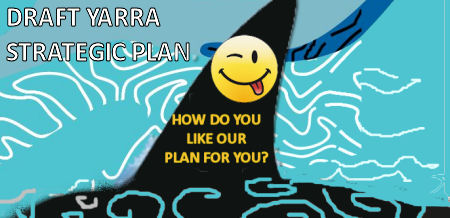
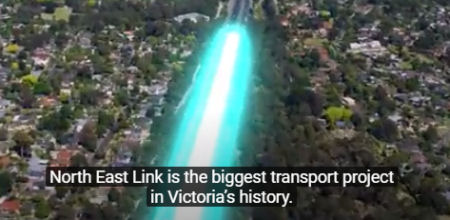
Introduction
The draft Yarra Strategic Plan rightly identifies climate change as a threat to the Yarra River. In this regard, climate change is neither more or less than a register of the failure of the human species to interact properly with the natural world. COVID - 19 also falls into that category.
Transport and the Yarra
The draft Plan gives too little attention to the relationship between transport and the health of the Yarra. This is a major flaw. The functionality of large cities is decided more than anything else by the dominant modes of mobility deployed in them.
The draft Plan declares (p. 16) that the Department of Transport "plans, builds and operates an integrated, sustainable and safe transport system across Victoria. It does not, actually, as little effort is made to integrate the various modes. Within the public transport sphere in particular, insufficient effort is made to ensure the connectivity of the network.
Even more importantly, the concept of integrated transport and land use planning has pretty much been abandoned by the Victorian government, and has done so since Melbourne 2030, with the concept of the poly-centric city at its core, was all but forgotten.
The idea (p. 12) that higher density residential development should be the sole province of inner areas is flawed. There is significant demand for higher density residential development in locations well removed from inner Melbourne. The central problem is that the government has abandoned the key enabler of this, which is high quality public transport across the whole of Melbourne.
The reality is that the modal mix for personal travel in the City of Melbourne is little different from what it was 50 years ago. The private motor car dominates. And it is very space-inefficient.
The draft Plan anticipates that Melbourne's population will grow to nearly 8 million by the year 2051, and with an extra 140,000 dwellings to be built in the Yarra River corridor by 2041.
There are no grounds, within current policy settings, that these "milestones" would be reached without damaging the environment very seriously. The central issue is that the Victorian government does not have a transport plan for Melbourne.
North East Link
The Victorian government's North East Link freeway project is hardly referred to in the draft Plan. It should be. It was developed in the absence of any consideration by the government of other forms of transport, and especially public transport, which would have a relatively benign effect on the Yarra River corridor.
It is understood that the extensive tunnelling proposed for the project would require the excavation of about 1.5 cubic metres of rock and soil, which would go to landfill (see Timna Jacks and Benjamin Preiss, "Warning over toxic soil from 'big dig,'" Sunday Age, December 1, 2019). It is not known whether any of the material is toxic and there appears to be insufficient landfill capacity to take it.
There appears to be potential for destabilisation of groundwater in the Yarra Valley in the Bulleen and Rosanna area as a consequence of the project.
Substantial areas of public open space is threatened by the project, together with about 25,000 mature canopy trees.
Adverse human health effects of the project would include increased air pollution and heightened road noise.
Paved surface area
One of the dysfunctional elements of the dominance of the motor car is the increase in paved road surface that is required to cater for ever-growing motor vehicle numbers. For instance, it is proposed to increase lanes capacity on the Eastern Freeway to cater for the North East Link project by over 40%, from 802,000 square metres to 1,127,000 square metres. The adverse environmental effects would include increased run-off of polluted stormwater into the Yarra River and elevated ambient temperatures as a consequence of the large increase in concrete and asphalt surfaces.
Local government and transport
It is not only at state government level that we have major policy failure in transport. For instance, if one is to consider the land area of the City of Boroondara, it is comprised of about 6,022 hectares, of which 1279 hectares, over 20%, is comprised of road reservations. About 80% of the land devoted to road reservations is controlled by the City of Boroondara, with the balance controlled by VicRoads. The reservations controlled by Boroondara contain about 560 kilometres of local roads.
Significantly, very few of these roads have been developed to provide for safe cycling traffic. They are designed, with few exceptions, exclusively for motor car traffic. Apart from the City of Yarra, the other councils with a direct interest in this project (the cities of Banyule, Manningham and Maroondah and the Shires of Nillumbik and Yarra Ranges), also appear relatively uninterested in increasing the mode share of space-efficient, and therefore environmentally friendly forms of transport.
Conclusions
The Status Assessment contained in the report of the Commissioner of Sustainability, State of the Yarra and its Parklands (2018), concluded that the status of the river was poor for 18 of its 25 environmental indicators.
These measures will continue to deteriorate unless substantial reforms are made to transport capacity in Melbourne, and especially in the Yarra River corridor, to preference space-efficient and less carbon polluting transport modes.
Ian Hundley
29 March 2020
Topic:
- groundwater
- Boroondara
- Banyule
- cycling
- stormwater
- runoff
- Manningham
- Maroondah
- Nillumbik Shire
- Yarra Ranges Shire
- hard surfaces
- heat islands
- North East Link
- Melbourne's overpopulation problem
- Melbourne's overdevelopment problem
- public transport
- draft Yarra strategic plan 2020
- high density
- climate change
- environment
- planning
- Melbourne
- Australia
Vid: Czech Republic significantly checks virus with masks for everyone
How will we cope with 8 million in Melbourne if we have another pandemic?
Over the last 30 to 40 years, an inexorable process has been in train in Melbourne.
A city that once boasted houses with gardens for the majority has given way to the cannibalisation of our gardens in the interests of accommodating an ever-increasing population. Thus, we have seen increasing medium and high density living in our suburbs, with significant and ongoing loss of trees, other vegetation, and space per person. At the same time we have seen encroachments on public land for ever more residential development. To name only two of many examples, there was the Commonwealth Games Village in Royal Park and the Eastern Golf Course in Doncaster, which were both turned into housing developments. The State Government in Victoria now plans to facilitate development on golf courses, according to their definition by a committee of developers as redundant green amenity.
As a result of Melbourne’s increase in population density, our public transport and roads have been struggling to cope for some years. Passengers now only just fit onto trams and trains, level crossings have had to be turned into overpasses and underpasses, in a disruptive and expensive exercise, all over Melbourne. But still the machine which is Melbourne manages to tick along and somehow function. But, to what end? we may ask, as our quality of life steadily diminishes. If Melbourne's inhabitants are just cogs in a big complex machine, built for wealthy international investors in property and finance, then I suppose we have to say it has been a success …until now.
In the last several days a huge number of the "cogs" have had to be de-activated for an indefinite period . The machine can no longer operate as it has been. But the non-essential " cogs" cannot be simply put away in a drawer. This is because they are not actually cogs. They are humans with lives and with needs. The even larger machine of the Australian government is obliged to sustain them all over the country. There is no other way.
The health crisis due to coronavirus must make those in authority and with power question what we have been doing over the last few decades. What has been the aim of the direction that the new economy adopted in the last years of last century? What I have seen is an erosion of our quality of life in many ways, but the loss of land and space per person is the most stark indicator. Now, in the current health crisis that we are virtually locked down in, our living environment, the amenity or lack of it, in our surroundings, is highlighted. How does a person living in a small apartment take care of his or her mental and physical health? This person no longer uses the small apartment simply as somewhere to sleep after returning from work and an evening get together with friends in a public place. This is now "home". Does it pass the test to qualify as such, or is it more like a prison cell?
The corona virus illustrates the great importance of the availability of public space for the population. Yet the public space we now need to practice safe distance in has been greatly reduced by overdevelopment in Melbourne.
Moreover, we cannot always exist as a crowd. We must separate and have our own space. We are individual beings. For those who still have them, private gardens are of huge importance. Their growing rarity is of great significance in Melbourne’s ability to cope with health and social problems. Had the corona virus struck 30 years ago, a far larger proportion of the population would have had such a refuge. Tragically, these gardens have been taken from us, with the push to live more densely. I use the word "push" deliberately" as we have been pushed into it. Planning in Australia’s big cities has amounted to coercion since the 1990s, with loss of formal rights of objection to the massive changes forced upon us.
Many philosophers, cartoonists and commentators have questioned the purpose of our lives - the "rat race", the overcrowding. I am doing the same as this crisis shrieks out for a serious re-evaluation of where we are going. We are barely coping now so how will we cope with 8 million in Melbourne if we have another pandemic?
Can Australia's government learn from COVID-19?
 Covid-19 is a warning. We can take it as such or ignore it if we get through it and come out the other side.
Covid-19 is a warning. We can take it as such or ignore it if we get through it and come out the other side.
High density, high population, high throughput, globalised manufacturing, global high mobility, are not working for us now. When we first learned in January of the outbreak of Covid -19 in Wuhan my first thought was that "This will be in Melbourne soon." Thirty years ago, I would not have had such a thought because China was so distant and separate. I was right, within a few days it was in Melbourne. On January 25th Australia had its first four cases, the first in Melbourne and another three in Sydney. At this time the city of Wuhan in China was in "lockdown".
I was most alarmed to learn that the disease could be spread by people with no symptoms, and that many did not have symptoms. For me that was the key piece of information that should have dictated government protocol to manage contagion.
By March 2nd, the first two cases of community transmission of Covid -19 were reported in Sydney. One was a woman who caught if from her brother recently returned from Iran and the second was a health care worker, working in close proximity with patients. On March 13th, the Victorian health department announced nine new cases of coronavirus in Victoria, including the state’s first community transmission, and it is now being transmitted at an alarming rate. As at 6.30 p.m. March 28th, Victoria's total case numbers were 685.
Now Victoria is in partial lockdown. We are being asked to stay home as much as possible. Businesses have been closed down, sporting facilities are closed, even beaches are closed in Melbourne. How did our governments let it come to this? If I could see it coming, they should have seen it coming. Why were governments apparently powerless to stop it?
Finally, the Tasmanian Government is now not letting people arrive from the mainland without quarantine. I heard a commentator say that this takes advantage of its geographical status as an island. That’s great, but the rest of Australia is also an island! We have blown our chance to stay clear of this scourge. If we had not blown our chances, people would not have had to die or lose their jobs. To me it is a debacle.
So, people will be spending a lot more time at home. The trouble is that "home" is not what it was thirty years ago. Home is now more likely to be an apartment, rather than a house with a garden. For those with a garden, it is far easier to endure days on end without going outside one's home, than it is for someone in a one-bedroom flat.
Lockdown arrangements have been introduced incrementally, which strikes me as policy on the run, and smacks of "shutting the stable door after the horse has bolted." We hear that schools must remain open and then they are closed. We heard the Prime Minister saying that he is going to a rugby match when most of the people I know had been avoiding crowds for at least a couple of weeks.
Why was a protocol not in place for protecting Australia's population? Now people have died, more will get sick and die, people out of work could lose their houses. The fallout is immense. The only thing I can think of giving the Australian government credit for is being ahead of the even more sluggish World Health Organisation, in declaring Covid-19 a pandemic.
The neo-liberal economy, globalisation, and the pandemic.
The very arrangement that makes money for the few is a bad arrangement for the many. Goods and labour move around the world as though geographical distance were meaningless. The movement of ships spreads environmental pests. The movement of people spreads disease. With the increased population density in Melbourne and other cities, due to rapid population growth, mostly from overseas migration, we in Australia are more likely to have close encounters with strangers than we would have had before Australia’s population numbers were ramped up. On a day like today - sunny and warm in autumn - we crave a walk outside. We think of the beach, but hesitate because others will be thinking the same, and it will be hard to walk on the now defined pathway without encountering people at close quarters, even briefly.
Victorian Senator Sarah Henderson was heard on the ABC a few days ago, saying that she had been a strong proponent of upgrades to the Great Ocean Road but now she urges people not to come to coastal towns even if they own "holiday houses" there. The recent obsession with increased mobility in this state is now something that will only serve Covid -19. Small towns have welcomed the commerce that tourism brings, but now it is unimportant compared with the need to stay isolated.
Australia's ailing economy: Economic stimulation means increasing human transactions and disease transmission
Stimulus packages surely are meant to stimulate the very behaviour that spreads the disease. They contradict moves to save the health of the nation. That is, they aim to increase economic activity, to wit transactions, whilst locking down decreases transactions. The responsibility of the government now is to support the population directly affected by the measures taken to save the health of the population. Those people directly affected are paying a big price.
This plague was forecast
Scientists have warned us for decades that a pandemic was overdue. We even knew it was likely to come from China in the form of a zoonose. We got a real-time warning when we first knew of the deadly virus in Wuhan. Despite all these warnings, we did not act quickly enough and we are now dealing with an exponentially rising number of Covid-19 cases. Our lives have been de-railed. Next time, we need to be ready to pull up the drawbridge sooner. We also need to be prepared in terms of manufactured goods. Supermarkets need to have warehouse supplies. Deliveries "just in time" are inadequate. We need more medical and nursing staff. We cannot just wear our health workers into the ground. Hospital cleaners and hospital management need to be prepared and knowledgeable in disinfection protocols and practices. Government needs to have more of a role in the economic structure of the country, taking health into account as an absolute priority, even if it's not economically rational!
When this crisis has passed will we go back to "Business as Usual," and again flounder just as badly when Covid -21 or 23 arrives?
COVID-19: Time the unsafe Australian Construction industry stopped demanding special consideration
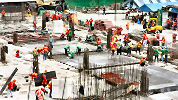 On 27 March 2020, the AWU and Master Builders Australia jointly called on governments to ensure the continued operation of the building and construction industry, claiming that without it the economic knock-on effects would be devastating on a scale that would dwarf what we have seen to date.
On 27 March 2020, the AWU and Master Builders Australia jointly called on governments to ensure the continued operation of the building and construction industry, claiming that without it the economic knock-on effects would be devastating on a scale that would dwarf what we have seen to date.
There is no question that many dependencies on this very costly and demanding industry would cause more economic disruption, but what about safety with regard to COVID-19? Although the industry argues that it can be safe, we will argue that the industry is not suited to workers keeping safe distances. On the principle that a stitch in time saves nine, it would be better to shut down sooner rather than later because the later action is taken, the worse the grip of COVID-19 will be on the economy. Since the virus has caused the government to cease the mass migration that has driven huge expansion in the construction industry, demand has dropped, and now is the perfect time to massively curtail construction industry activity. In the meantime, will the industry take responsibility for the return home of the many temporary migrant construction workers from China and Indonesia who, unlike international cruise-ship passengers, are already onshore, virtually invisible, but numerous? And an industry worker argues that the industry is not capable of adapting to safe distance practice.
“The shutdown of the construction industry would jeopardise not just those employed directly, but the whole livelihoods of millions of Australians employed in precarious sectors like manufacturing. It would devastate nationally important industries in the building supply chain, like the $30 billion steel industry,” say the AWU and MBA.
This shows that we have become too dependent on this industry. It has an unhealthy hold on our economy, our political system, our politicians and political parties. This hold has destroyed business, industry and employment diversity in Australia, because agriculture and ordinary manufacturing cannot compete with the inflated profits of the rapidly metastasizing property development sector, which attracts finance away from other sectors.
The same industry has successfully lobbied decades for faster and faster population growth, via mass immigration, to drive demand for its product. Now the demand will dry up as immigration has been stopped, finally providing an interruption to property-development’s hold on our economy.
As well as importing customers, the industry has also exploited many temporary migrants, undermining immigration rules, safety, wages and other employment conditions. The industry may have profited, but prices have risen and standards have dropped, to the extent that buildings over three stories are now uninsurable.
The AWU and MBA argue that, “Forcing the industry’s closure would also blunt the impact of federal, state and territory government stimulus packages as infrastructure projects would immediately grind to a halt. Civil construction, in particular, must continue to build the nation and can do so safely given the nature of its sites.”
The cry of ‘nation-building’ has led to overdevelopment with disastrous drops in building standards and environmental amenity. Australians have suffered from constant upheaval and loss of democracy as government outsourced planning to developers. In the name of catering to unprecedented population growth, Australian cities, suburbs and regions have been taken out of the control of their residents, subjected to constant infrastructure expansion, road-building, traffic diversions, and destruction of loved environment.
The AWU and MBA’s line is: ”Indeed, the catastrophic threat of a construction shutdown means the whole construction industry has a civic duty to impress upon authorities it can operate while ensuring compliance with social distancing and hygiene requirements.”
How could anyone have confidence in an industry known for corrupting government at all levels, bullying, unaccountability, uninsurability, and lawlessness? This industry has seen thousands of Australians bankrupted and homeless. Multiple inquiries into its dysfunctionality have failed to reform it. It is time to stop dancing to the demands of this industry. Australia has been living beyond its means in an artificially and unreasonably accelerated growth period.
The AWU and MBA try to present a picture of reform and responsibility:
“That means everyone in the industry has to step up and be accountable. Construction companies and project managers must ensure that protocols at their site are enforced. Construction workers owe it to each other and their families to be responsible and do the right thing. This is only the only way the industry can continue working while reducing the risk of COVID-19 transmission.”
Unsafe: Safe distance mostly impossible in Construction industry
An industry worker, who prefers to remain anonymous, says:
“Practising safe distance at building sites for most activities is impossible.
It is generally not safe for one person to work alone in the industry. Usually construction sites involve many people in many activities simultaneously, crisscrossing each other in small and often confined spaces, sharing narrow temporary paths and causeways.
In multi-storey building construction, hoists are used to bring people to various floors. These hoists are always crammed with people. It is not affordable to take people (or loads) one at a time.
Concreters work closely together when they lay concrete, frequently in small areas. You might have one worker using a scrider, and two others using a shovel or a vibrator, not even half a meter from each other. You will often get four or five people a couple of meters square, due to the need to act together to carry out the work. It would be hard or impossible for one person to do such work alone. It would be uneconomical for less than four or five.
High-rise work employs huge crowds of skilled and unskilled workers. It is common in the construction of a multi-storey building to have 40 steel-fixers and 40 form-workers operating simultaneously on one floor.
The nature of the industry entails very basic conditions of hygiene and shelter. Disinfection and maintenance of disinfection in such areas, where many workers are coming and going, would require a large-scale dedicated team of cleaners and supervisors with the authority to stop and start work. It would be dangerous to have such teams present on building sites.
Construction sites are scenes of intense activity, with many people interacting on many processes, helping each other. The cost of construction means that things are done as quickly as possible.
When trucks are unloaded, you often have many labourers unloading next to each other.
It is rare for one person to work alone. Generally speaking, in this industry, safety requires workers to work in pairs or in larger groups.
People are often required to work in confined space and they then need another person to assist with tools and equipment, physically handing these from one person to the next.
Transport is often shared. People habitually organise to come and go to work in one vehicle because many jobs are not accessible by public transport.
Many temporary migrants are moved in and out of construction sites in busloads from densely shared accommodation. A large proportion are Chinese and Indonesian. They often do not speak or read any English, and certainly not enough to know how to protect themselves. They tend to be insecure in their employment and visa status and are not likely to exercise their rights to safety, if they know them. These workers are like a separate population on construction sites, with whom only basic communication is possible, usually via their own foreman.Will the industry now take steps to finance these workers’ return home?”
The AWU and the MBA say in their press release:
”In times of crisis people look to unions, industry, and government to work together. We have to show we can not only slow the spread of COIVID-19 but ensure there's an economy left when the crisis is over.”
The problem is that unions and government have been working for industry and against democracy for too long. Let’s hope the AWU and the MBA, the Property Council of Australia and all the other corporate coercers who have been calling our tune start to adapt to reality for a change.
Staying Safe with COVID-19 in Australia
What do we know about Chloroquine use against COVID-19?
Announcement: Less new content on candobetter until 4 April because editor is away
Existing and future hearings of Planning Panels Victoria - memo
Advice from:
Department of Environment, Land, Water & Planning
planning.vic.gov.au | Enquiries: 136 186
Michele
POSITION OF PLANNING PANELS VICTORIA FOR EXISTING AND FUTURE HEARING MATTERS
In response to the COVID-19 pandemic, Planning Panels Victoria (PPV) is exploring a number of options to progress current and new matters, but we will need to change our practices.
Primarily we are seeking to minimise face to face contact and gatherings of people.
This will require the cooperation of all involved in the PPV process.
We will be consulting with all submitters and parties in relation to alternative arrangements for hearings, and any arrangements that are put in place will be consistent with the requirements for procedural fairness.
For the time being, it is unlikely that new face to face hearings will be scheduled. Directions Hearing for all new matters will be undertaken on the papers.
Options for hearings on the papers, or using technology such as teleconferencing or video conferencing are being explored.
Each Chair/Panel will review its current matters and will provide advice on a process going forward direct to its submitters.
Some imminent hearings with multiple submitters and parties are likely to be postponed in the short term while options are explored.
We thank you for your patience and understanding during this challenging time for our community.
Kathy Mitchell, Chief Panel Member, Planning Panels Victoria
Quarantined Italians Send a Message to Themselves 10 Days Ago: What They Wish They Knew Then
Countries like the US, England, France, Spain and Germany are about 9-10 days behind in the COVID-19 progression. For our benefit, the video channel called "A THING BY" asked Italians to record a message they wish had heard 10 days prior. Let's take careful note of what they have to say.
Capitalism, Closed for business & COVID-19? Oz economist, Steve Keen
Our version of capitalism is something the narcissistic writer Ayn Rand would have adored, but in a headlong rush to hyper-individualism, have we chosen freedom of the individual over the survival of our species…
Host Ross Ashcroft is joined by economist and author, Professor Steve Keen to discuss why coronavirus has closed capitalism.
Cardiologist advice for Australians with heart risks in evolving COVID-19 situation
 Cardiologist, Professor Jepson, urges people with cardiovascular risk issues to take more control of their situation.
Cardiologist, Professor Jepson, urges people with cardiovascular risk issues to take more control of their situation.
Getting to the heart of Covid-19
Advice for Australians with heart risk factors in evolving situation, from Professor Nigel Jepson, medical director of Eastern Heart Clinic, Randwick, NSW. Professor Jepson's summary is:
· That Australia [...] ‘must increase vigilance and adopt even stricter measures’ to avoid the trajectory [that COVID-19] has taken in Northern Italy,’ says Professor Nigel Jepson, interventional cardiologist at Prince of Wales Hospital and Medical Director of Eastern Heart Clinic, Randwick NSW.
· Particularly vulnerable are the 1.2 million Australians currently living with cardiovascular disease (CVD);[1] more than 1 in 4 (26%) of those aged 75 and over have heart, stroke and vascular disease.[2]2
· This group and people with other conditions that affect the heart and vascular system, such as high blood pressure, chronic respiratory disease and diabetes, are at elevated risk of developing complications if they contract COVID-19.3 In an ordinary year, CVD already leads to an average of more than 1 million hospitalisations.2
· In addition to following the Government’s advice on social distancing and hygiene, Prof Jepson advises that people with CVD should start following ‘heightened’ measures(below).
· ‘We can see from the data in Wuhan that patients with an underlying heart condition may not be more likely to become infected in the first place but are at higher risk of developing complications including breathing problems, abnormal heart rhythms or, ultimately, heart failure, than others,’ says Prof Jepson. This increased risk of death for people with CVD is estimated to be nearly 10% higher than a ‘healthy’ patient.[3]
· ‘We don’t want to create fear or panic but I don’t think we’re really getting the message across that, while for most of us COVID-19 would be an innocuous disease to get, we need to adopt caution and care to slow the rate of spread as much as possible, in order to protect those who could be more seriously affected.
· ‘We also want to avoid clogging up hospitals. It makes no sense to say, ‘Let’s all get it now, and get it over with’ - that’s nonsensical and dangerous - because we need the emergency beds, equipment and personnel for acute COVID-19 patients or any other person requiring emergency medical care, or we will find ourselves buckling under the pressure, like the health services in Lombardy (northern Italy)’.
· New Italian data released at the weekend shows higher death rates than in China, Iran or Korea.[4] The precise reasons for the higher rates are not clear, but it is thought that very rapid community spread of COVID-19 and a saturated health system were at least significant contributors.
10 WAYS PEOPLE WITH HEART ISSUES CAN REDUCE THEIR COVID-19 RISK:
1. Avoid large gatherings (even contexts with fewer than 500 people) e.g theatres, cinemas, concerts and shopping centres [Candobetter Editor says, Oh, come on, Prof Jepson, stop the pussyfooting, surely you mean much smaller crowds, to wit, avoid groups.]
2. Exercise caution when using public transport - avoid busy times and routes in known outbreak areas; make alternative travel arrangements
3. Do not travel unnecessarily - avoid airports, train stations and bus terminals
4. Go shopping at quiet times- or take advantage of major supermarkets’ time slots for older people only
5. Have your prescriptions for heart medicines filled now – ask your pharmacist and GP to assist as shortages are occurring in some areas
6. Postpone non-urgent medical appointments or procedures - or consult your healthcare professional by phone or ‘telehealth’ instead
7. Stock up on groceries (within reason) – you’re going to be at home more, so organise for online deliveries (friends and family can help)
8. Get vaccinated – stick to plans to be vaccinated for influenza and pneumonia, and others as your doctor advises, to avoid developing other conditions that can be confused with coronavirus (such as flu)
9. Stay healthy - eat well, get enough sleep and follow exercise regimens as advised by your healthcare professionals
10. Keep calm and carry on - if you live alone, think about low-risk activities you can do to socialise, such as meeting a friend outdoors for a walk
Professor Nigel Jepson is the medical director of Eastern Heart Clinic, one of the largest interventional cardiology hospitals in Australia, based at the Prince of Wales Hospital at Randwick. He is also a senior staff cardiologist at the Prince of Wales Hospital, where he established the unit’s trans-catheter aortic valve program.
References:
1. ABS. https://www.abs.gov.au/ausstats/[email protected]/mf/4364.0.55.001
2. AIHW. https://www.aihw.gov.au/reports/heart-stroke-vascular-disease/cardiovascular-health-compendium/contents/how-many-australians-have-cardiovascular-disease
3. Chinese Center for Disease Control and Prevention, CCDC Weekly, Vol 2, No. 8
4. World Health Organisation Situation Reports 16 March 2020. https://www.who.int/docs/default-source/coronaviruse/situation-reports/20200316-sitrep-56-covid-19.pdf?sfvrsn=9fda7db2_2
Terrible news for Seaford environment (Vic, Australia) as Gov lets open slather

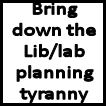
 Frankston Councillor Glenn Aitken was notified on Thursday 12 March that the LXRP 'works' east of the railway line at Seaford will proceed without further consultation. "It is likely they will remove more vegetation immediately.They will flatten pretty much everything on the eastern side of the railway line from Eel Race Rd to Coolibar Ave. There is no right of appeal as it is on their land which...they conveniently forget... is still public land, owned by the State." This is the clear message that authorities need to hear and heed,as expressed by Cr Glenn, "Our natural environment is not negotiable and must be protected."
Frankston Councillor Glenn Aitken was notified on Thursday 12 March that the LXRP 'works' east of the railway line at Seaford will proceed without further consultation. "It is likely they will remove more vegetation immediately.They will flatten pretty much everything on the eastern side of the railway line from Eel Race Rd to Coolibar Ave. There is no right of appeal as it is on their land which...they conveniently forget... is still public land, owned by the State." This is the clear message that authorities need to hear and heed,as expressed by Cr Glenn, "Our natural environment is not negotiable and must be protected."
You can watch more of Cr Glenn's inspirational Proclamation of 24 February here:
Unfortunately the 'authorities' are not listening to the community, but to the population boosters and developers in and close to government.
Please let your protests be heard and voice your opposition to the wilful environmental destruction without delay to Sonya Kilkenny MP for Carrum :
- telephone her office at (03) 9773 2727
- post on her Facebook page :https://www.facebook.com/SonyaKilkennyMP/ and alert others
- post on other social media platforms
- alert your friends and contacts
Whether or not the vegetation is on railway controlled land is irrelevant.
The vegetation is still a vital connection to the coastal corridor.
Birds, native bees, animals or other inhabitants of the coastal corridor don’t look at a tree and choose not to go there because it’s under railway and State governance.
Cr Glenn is arranging a public meeting and further notice will be given when arrangements are finalised.
Coronavirus: Why You Must Act Now - by Tomas Pueyo

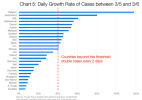 With everything that’s happening about the Coronavirus, it might be very hard to make a decision of what to do today. Should you wait for more information? Do something today? What?
With everything that’s happening about the Coronavirus, it might be very hard to make a decision of what to do today. Should you wait for more information? Do something today? What?
Here’s what I’m going to cover in this article, with lots of charts, data and models with plenty of sources:
How many cases of coronavirus will there be in your area?
What will happen when these cases materialize?
What should you do?
When?
When you’re done reading the article, this is what you’ll take away:
The coronavirus is coming to you.
It’s coming at an exponential speed: gradually, and then suddenly.
It’s a matter of days. Maybe a week or two.
When it does, your healthcare system will be overwhelmed.
Your fellow citizens will be treated in the hallways.
Exhausted healthcare workers will break down. Some will die.
They will have to decide which patient gets the oxygen and which one dies.
The only way to prevent this is social distancing today. Not tomorrow. Today.
That means keeping as many people home as possible, starting now.
As a politician, community leader or business leader, you have the power and the responsibility to prevent this.
Read more & see graphs here
Urbanisation and Natural contaminant threat to drinking water from groundwater
 The 'densification' that planners push to accommodate overpopulation drives increasing water pollution risks, along with climate change. “Generally, we expect urbanisation to increase groundwater DOC (dissolved organic carbon) concentrations by up to 19 per cent, compared to agricultural or natural land use, likely as the result of contamination – for example, through leaking septic and sewer systems.” (Research paper.)
The 'densification' that planners push to accommodate overpopulation drives increasing water pollution risks, along with climate change. “Generally, we expect urbanisation to increase groundwater DOC (dissolved organic carbon) concentrations by up to 19 per cent, compared to agricultural or natural land use, likely as the result of contamination – for example, through leaking septic and sewer systems.” (Research paper.)
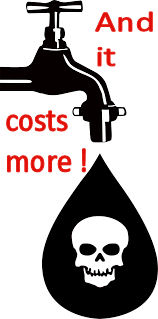
Climate change and urbanisation are set to threaten groundwater drinking water quality, new research from UNSW Sydney shows.
More than half of the world’s population faces a looming threat to the quality and availability of their drinking water because climate change and urbanisation are expected to cause an increase in groundwater organic carbon, a new UNSW study has found.
The research, published in Nature Communications overnight, examined the largest global dataset of 9404 published and unpublished groundwater dissolved organic carbon (DOC) concentrations from aquifers in 32 countries across six continents.
DOC is a naturally occurring component of groundwater, but the higher its concentration, the more difficult and expensive it is to make groundwater drinkable. In Australia, groundwater is widely used as the main source of drinking water for many cities and towns.
Lead author Dr Liza McDonough, of the Connected Waters Initiative Research Centre at UNSW, said the study forecasted elevated DOC concentrations because of projected changes in temperature and rainfall due to climate change, as well as increased urbanisation.
“We identified groundwater DOC concentration increases of up to 45 per cent, largely because of increased temperatures in the wettest quarter of the year – for example, in a number of south-eastern states in the United States. We predict increases in DOC in these locations could increase water costs for a family of four by US$134 per year,” Dr McDonough said.
“Other areas such as eastern China, India and parts of Africa already experience severe groundwater contamination issues. These may be further compounded, particularly in south-eastern China, by groundwater DOC increases associated with large predicted increases in temperature in the wettest quarter of the year by 2050.
“Generally, we expect urbanisation to increase groundwater DOC concentrations by up to 19 per cent, compared to agricultural or natural land use, likely as the result of contamination – for example, through leaking septic and sewer systems.”
The research, a collaboration between UNSW, the Australian Nuclear Science and Technology Organisation (ANSTO), Southern Cross University, British Geological Survey, and the University of Bradford, found four major contributing factors to groundwater DOC levels: climate, land use, inorganic chemistry and aquifer age.
Health threat
Dr McDonough said increased groundwater DOC, whether naturally occurring or due to contamination, also posed a threat to human health.
“Groundwater is Earth’s largest source of freshwater and provides essential drinking water for more than 50 per cent of the world’s population,” she said.
“But, because most health impacts caused by DOC are related to the formation of by-products of water treatment chlorination and depend on concentrations of other water chemical parameters, the World Health Organization and many countries – including Australia – do not regulate DOC concentrations in drinking water directly.”
Dr McDonough said that while DOC is a naturally occurring, key element of groundwater it could combine with, and transport, potentially dangerous heavy metals otherwise bound to rocks and sediment where groundwater occurs.
“This is a concern when, for example, more than 100,000 lifetime cancer cases in the United States alone can be attributed to drinking water contaminants,” she said.
Water treatment costs to rise
Dr McDonough said it was important to understand what caused high DOC concentrations in groundwater.
“An increase in groundwater DOC concentration impacts the ability and therefore cost to make groundwater drinkable,” she said.
“For example, we projected a 16 per cent increase in annual household water costs in some parts of the United States because of rising water treatment costs – due to the need to implement additional water treatment measures to remove increased DOC concentrations.
“The decrease in groundwater quality and substantial increase in water treatment costs will also compound existing constraints on groundwater resources, including availability.”
Wet vs arid climates
Dr McDonough said the impacts on groundwater DOC levels from climate change and urbanisation, while likely to occur globally, differed by geography and climate.
“Our research found that in arid climates, groundwater DOC concentrations increased with higher rainfall because microbes can better break down organic matter, such as leaves, under warm and increasingly wet conditions,” she said.
“Increased temperatures in arid environments, however, reduced groundwater DOC concentrations because when conditions are too hot and dry, vegetation and organic matter sources are limited.
“By contrast, increased rain in warm and wet environments decreased groundwater DOC concentrations because heavy rainfall dilutes the DOC in groundwater.”
Water treatment solutions
Dr McDonough said she looked forward to conducting further research to determine the best water treatment options for areas where groundwater DOC concentrations are anticipated to increase.
“Our next step is to investigate how the character of DOC changes when you have different aquifer minerals, because some types of organic matter can stick to certain mineral surfaces and ultimately reduce this type of organic matter remaining in the water,” she said.
“This will help provide guidance on the most suitable water treatment options in areas where DOC concentrations are expected to increase.”
Read the full research paper in Nature Communications: https://www.nature.com/articles/s41467-020-14946-1
Coronavirus: Hospital absurdities and infection control
 I was talking to a nursing friend who works in a large suburban Melbourne hospital emergency department, triaging patients for a particular area. I will call her Angie.
I was talking to a nursing friend who works in a large suburban Melbourne hospital emergency department, triaging patients for a particular area. I will call her Angie.
Given the high through-put of patients in the area in this time when we are supposed to be trying to reduce the transmission of coronavirus, I was curious to know what measures her hospital was taking to protect their staff and patients.

ANGIE: "None, as far as I know," she said.
NEUTRINO: "You're not issued with masks for every new examination? You're not wiping down surfaces with alcohol or sodium hypochlorite, with every new patient? You are not even wearing gloves? You're not screening people in the waiting room for high temperatures?"
ANGIE: "That's right," she said, and laughed, as nurses do when they acknowledge helplessness at the behest of universally absurd hospital systems.
NEUTRINO: "Are they discussing policy with you, at least?"
ANGIE: "We get emails from them from time to time."
NEUTRINO: "Emails saying what?"
ANGIE: "Oh, just the number of infections in the state and the country."
NEUTRINO: "Do they tell you where they infections are and which hospitals are looking after them?"
ANGIE: "No."
NEUTRINO: "Then you're not getting any more information than the general public does from the news?"
ANGIE: "I guess so."
NEUTRINO: "Are you going to cancel your trip to Japan?"
ANGIE: "Probably, although it seems to me we may be in more danger here. At least the Japanese have cancelled most of their public festivals and tourism attractions."
NEUTRINO: "They have also closed all schools and universities."
ANGIE: "Yes."
NEUTRINO: "Ambivalence rules infection control in Australia. For instance, in Sydney, one school where there was an infected pupil reopened a few days later, and the day it reopened, another closed with two infected pupils."
ANGIE: "So, would you like to meet for coffee at the Italian restaurant on my days off?"
NEUTRINO: "Please don't take this personally, but I'd rather we keep it to telephone conversations for the time being."
ANGIE: "I don't take it personally at all. I don't blame you. Telephone is fine."
NEUTRINO: "Good.
ANGIE: "Although we could meet for coffee on the terrace of the Italian restaurant."
NEUTRINO: "How about we meet on a bench on the beach, and I'll bring a thermos."
ANGIE: "Okay, but I'll get my coffee from the restaurant."
Duran analysis vid: "Putin furious with Erdogan, but will he stop Turkey's war in Syria?"
The Duran’s Alex Christoforou and Editor-in-Chief Alexander Mercouris discuss the meeting in Moscow between Russian President Putin and Turkey's Erdogan. Erdogan made many outrageous claims, including that Turkey had killed over 2,500 Syrian troops during fighting in Idlib's surrounding areas...a claim which is ridiculous on its face, and exposes how out of touch the Turkish leader is when it comes to this reckless invasion of Syrian sovereignty. See more at The Duran: https://theduran.com
Tucker Carlson & Roger Waters (Pink Floyd) on Julian Assange
The Case for Use of masks by Public in an Epidemic (Coronavirus) - Registered Nurse
 Here is the case for wearing masks whether you are infected or not. In my opinion, people should proceed as if they are infected and wear a mask in order to protect others in the community. Waiting until you are infected is like closing the stable door after the horse has bolted. None of us know when or if we are infected until/if symptoms arise and are tested. We could be infected without ever knowing. If we all wear masks (and gloves) in public we can substantially reduce infection risk. Official support for this would help us to overide embarassment or the stigma involved in initiating a new public behaviour. Shop owners and other businesses with a public interface can reassure the public by offering masks and gloves at the entrance, and keeping alcohol wipes close to cash registers and electronic keypads, and wiping them with every use or making sure that customers wipe them with every use (and wait 10 minutes between uses).
Here is the case for wearing masks whether you are infected or not. In my opinion, people should proceed as if they are infected and wear a mask in order to protect others in the community. Waiting until you are infected is like closing the stable door after the horse has bolted. None of us know when or if we are infected until/if symptoms arise and are tested. We could be infected without ever knowing. If we all wear masks (and gloves) in public we can substantially reduce infection risk. Official support for this would help us to overide embarassment or the stigma involved in initiating a new public behaviour. Shop owners and other businesses with a public interface can reassure the public by offering masks and gloves at the entrance, and keeping alcohol wipes close to cash registers and electronic keypads, and wiping them with every use or making sure that customers wipe them with every use (and wait 10 minutes between uses).
In Australia and in many western countries, the public have been advised that they should not wear a mask unless they are infected. The explanation is that a mask helps to prevent droplets escaping from an infected person, and that it will not protect an uninfected person from other unmasked peoples' droplets. The problem is that people cannot know whether we have been infected and will only find out if they become ill or are linked to a known infected person and thence formally diagnosed. So if we behave as if we are infected, and wear masks, we will be increasing public safety by reducing droplet transmission through use of the mask as a barrier. We need to be careful when we remove the mask; we should avoid touching the exterior and abrupt movements that might dislodge droplets from the outside. See third video at the end of this article.
Most of us realise there is a logical dissonance in the advice we are receiving about masks. Some of us think this is because of the shortage of masks. The government should be ensuring local manufacture and distribution of quality masks. Unfortunately it is unlikely that really effective masks will become available to the general public - due to problems of supply as much as policy.
In the meantime, it is possible to make relatively effective masks to prevent the spread of infection, as in the first video. These are basically absorbent barriers and last 2-4 hours. The second video evaluates different kinds of mask, notably the N95 mask (which excludes up to 95% of particles). The third video explains how to use and remove a commercially manufactured N95 mask.
New Land Tax Act changes really a tax on Mother Nature
 People should know about the state government’s amendments to the Land Tax Act. An interesting article was written about it by Michael Flynn QC in The Age of February 17th 2020. regarding the amendment to the Land Tax Act to restrict land tax exemptions on contiguously rated properties only to regional Victoria. See: https://www.theage.com.au/national/victoria/home-owners-could-be-slugged-with-an-unfair-tax-20200213-p540jq.html. These changes have resulted in charging land tax for anyone in metropolitan Melbourne with vacant land contiguous with their place of residence. Until now, land adjacent to your home was exempt from Land Tax if the property was rated by Council as contiguous (i.e. house and land rated as one parcel of land) The new amendment has changed this to now levy the tax on any properties in metropolitan Melbourne which have contiguous vacant land next to a place of residence. (For the purposes of this exercise, Mornington Peninsula also is considered to be metropolitan by the way). A paltry $43 million revenue is anticipated.
People should know about the state government’s amendments to the Land Tax Act. An interesting article was written about it by Michael Flynn QC in The Age of February 17th 2020. regarding the amendment to the Land Tax Act to restrict land tax exemptions on contiguously rated properties only to regional Victoria. See: https://www.theage.com.au/national/victoria/home-owners-could-be-slugged-with-an-unfair-tax-20200213-p540jq.html. These changes have resulted in charging land tax for anyone in metropolitan Melbourne with vacant land contiguous with their place of residence. Until now, land adjacent to your home was exempt from Land Tax if the property was rated by Council as contiguous (i.e. house and land rated as one parcel of land) The new amendment has changed this to now levy the tax on any properties in metropolitan Melbourne which have contiguous vacant land next to a place of residence. (For the purposes of this exercise, Mornington Peninsula also is considered to be metropolitan by the way). A paltry $43 million revenue is anticipated.
We have just received a Land Tax bill for $7,786 for two vacant blocks adjoining our house on the Mornington Peninsula. We currently maintain the two vacant lots as 'Land for Wildlife’ – effectively as our bush garden. The garden provides the last remaining piece of intact habitat in the surrounding estate – and we say provides open space and improves the amenity of the area for all other resident too. Many other affected people might have veggie gardens, sheds, animal runs, chook pens etc.
We spoke to the State Revenue Office asking why the Act was amended, and were advised that there was a land shortage in Melbourne due to population pressures and that therefore the land should be developed. So, clearly this “initiative” is designed to get people with vacant land next to their existing homes to sell the vacant land- or maybe the home as well. The consequences of this are obvious: Developer windfall resulting in more people, more traffic, less trees, lost amenity and privacy etc. etc.
Many people affected by this change to the Land Tax Act might be asset rich but cash poor, living in properties they have owned for decades. The dramatic fall in interest rates is likely adversely affecting their ability to meet their existing costs of living, let alone a new land tax bill in the thousands of dollars. Presumably most affected people in the real metropolitan Melbourne, will have sites valued higher than ours on the Mornington Peninsula so will likely be getting bills for even more $$ than we have. They might have no alternative but to sell up.
I suspect many people would be horrified by this latest effort to destroy suburban amenity and impose social engineering on people who can no longer afford to live where they want to, just so we can jam in more people. It smacks of a desperate attempt by government to please developer mates by freeing up any remaining vacant sites in the suburbs for developers to move in- meanwhile existing residents are yet again the losers.
Surely this is an unfair and unjust tax. It was slipped in without any consultation with affected people or the wider community. It certainly was not flagged as a policy in the last state election, and the predicted $43 million revenue - for all the inconvenience it imposes on home owners and likely environmental and amenity impacts - is paltry in the extreme.
You can do a lot more to avoid coronavirus infection - Registered Nurse


 Here is the opinion of an ex-infection control nurse, on the situation with Corona virus. Use virocides (e.g. methylated spirits and bleach) to disinfect because bacteriocides (most of the handwashes that are disappearing from supermarkets) are ineffective. Cash is dirty - viruses can survive on notes and coins; use electronic cards, but clean keypads and keyboards with alcohol disinfectants with each customer. Act now to avoid unnecessary interactions with other people; don't wait to be told. Worst case scenario is if the infection rate climbs too fast for hospitals to treat the severe cases, because then mortality and economic consequences will multiply, so we need to act to delay infections. The government seems too focused on the economy. If Australia develops a severe epidemic, the economy will be cactus anyhow. The best way to go is with an early economic interruption, so as to slow the infection rate and stop it, rather than delaying shutting non-essential businesses down. The government should (a) provide financial relief in the form of a sickness benefit for interrupted employment and business to assist people to be able to avoid employment interactions, and (b) distribute food where needed.
Here is the opinion of an ex-infection control nurse, on the situation with Corona virus. Use virocides (e.g. methylated spirits and bleach) to disinfect because bacteriocides (most of the handwashes that are disappearing from supermarkets) are ineffective. Cash is dirty - viruses can survive on notes and coins; use electronic cards, but clean keypads and keyboards with alcohol disinfectants with each customer. Act now to avoid unnecessary interactions with other people; don't wait to be told. Worst case scenario is if the infection rate climbs too fast for hospitals to treat the severe cases, because then mortality and economic consequences will multiply, so we need to act to delay infections. The government seems too focused on the economy. If Australia develops a severe epidemic, the economy will be cactus anyhow. The best way to go is with an early economic interruption, so as to slow the infection rate and stop it, rather than delaying shutting non-essential businesses down. The government should (a) provide financial relief in the form of a sickness benefit for interrupted employment and business to assist people to be able to avoid employment interactions, and (b) distribute food where needed.
The mortality rate estimation (among known infections) has risen from 2.5 to over 3%. Although this is still quite low, because the virus is so very very infectious, it probably means that many millions will die, worldwide.
Most importantly, even this mortality rate, however, relies on people who develop serious secondary infections having access to intensive care in hospitals.
The worst that could happen
The biggest problem that can arise is if there are so many infections that the hospitals cannot cope. Then the death rate will rise significantly.
What you and I can do
You and I and other people need to take the initiative to minimise our interactions with others to only those that are absolutely necessary. Avoid crowds and shops. This could help to keep the infection rate down to a level that hospitals could cope with. That is essential. We should not be waiting until the government tells us to do this, since this is the measure that will reduce the outbreak at the outset.
The Victorian government is, however, telling people to make arrangements to stock up on non-perishable food and essential items in order to be able to isolate themselves for two to three weeks. That indicates an awareness that things are likely to get serious. Although the idea behind this is for people to self-isolate if infected, it is also something that people most at risk can do to avoid becoming infected.
Things to stock up on
Eggs, tinned meat and fish, vegetables and fruit that can be cooked and washed in soap and water, fresh meat and fish which can be frozen. Beans and lentils, which can be stored, then boiled.
How to disinfect things: Use virocides
Yes, hand-washing is crucial, but shops and households need to be able to disinfect keypads, keyboards, doorknobs and handles, and products, tables, cars, shelves, benches, and households. Ordinary antibacterial solutions do not kill viruses and we are dealing with viruses. Methylated spirits and bleach do. Methylated spirits is good and cheap for disinfecting hard surfaces rapidly and you can also use it on your skin as in hands and face. Bleach needs to be strong and fresh. Look up the instructions. You need stronger solutions to disinfect body-fluid spills. Don't use hot water. Don't splash in eyes. Ensure ventilation because the fumes are irritating and can affect breathing.(https://www.ncbi.nlm.nih.gov/books/NBK214356/)
Avoid cash and wipe keypads and keyboards
Don't use cash. Money - notes and coins - is a great vector for viruses. Use electronic money, but ask for the business to disinfect the keypad, or carry an alcohol-impregnated wipe and clean the keypad yourself.
Who is most vulnerable?
"Nanshan Chen, MD, of Jinyintan Hospital, Wuhan, and his team conducted a retrospective study on 99 cases and, in very short order, published their initial findings in the Lancet online on Jan. 29. These findings could guide action in other cases and help clinicians all over the world create treatment plans for patients of the 2019-nCoV.
The findings show that older men and patients with comorbidities appear most likely to develop pneumonia associated with the 2019 novel coronavirus (2019-nCoV), and characteristics of those with fatal infections align with the MuLBSTA score — an early warning model for predicting viral pneumonia-related mortality, according to a case review." (Sharon Worcester, Novel Coronavirus: Case Review IDs Clinical Characteristics.)

Recent comments